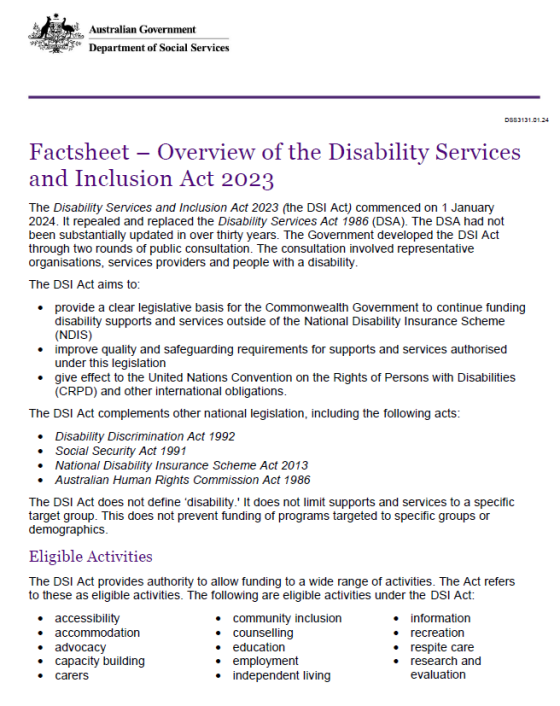The Disability Services and Inclusion Act 2023 (the DSI Act) commenced on 1 January 2024. It repealed and replaced the Disability Services Act 1986 (DSA). The DSA had not been substantially updated in over thirty years. The Government developed the DSI Act through two rounds of public consultation. The consultation involved representative organisations, services providers and people with a disability.
The DSI Act aims to:
- provide a clear legislative basis for the Commonwealth Government to continue funding disability supports and services outside of the National Disability Insurance Scheme (NDIS)
- improve quality and safeguarding requirements for supports and services authorised under this legislation
- give effect to the United Nations Convention on the Rights of Persons with Disabilities (CRPD) and other international obligations.
The DSI Act complements other national legislation, including the following acts:
- Disability Discrimination Act 1992
- Social Security Act 1991
- National Disability Insurance Scheme Act 2013
- Australian Human Rights Commission Act 1986
The DSI Act does not define ‘disability.' It does not limit supports and services to a specific target group. This does not prevent funding of programs targeted to specific groups or demographics.
The DSI Act provides authority to allow funding to a wide range of activities. The Act refers to these as eligible activities. The following are eligible activities under the DSI Act:
- Accessibility
- Accommodation
- advocacy
- capacity building
- carers
- community inclusion
- counselling
- education
- employment
- independent living
- information
- recreation
- respite care
- research and evaluation
The DSI Act contains statutory funding conditions. These are rules that all service providers must follow to receive funding. These requirements set clear expectations to service providers and people with a disability. This makes it easier to identify when providers are failing to meet requirements. These funding conditions aim to balance safeguarding with minimising regulatory burden. These are:
- complying with the Code of Conduct
- holding a certificate of compliance, if the arrangement or grant is a regulated activity
- implementing and maintaining an appropriate complaints management system
- implementing and maintaining an appropriate incident management system
- not being subject to a NDIS banning order.
The DSI Act allows the Minister or the Secretary to make five legislative instruments under the DSI Act. These legislative instruments are listed below.
Code of Conduct Instrument
- The Code of Conduct mirrors the NDIS Code of Conduct. It sets out expectations for safe and ethical service delivery.
Regulated Activities Instrument
- Certain activities funded by the DSI Act may be higher risk. These activities may be subject to additional regulation and are called ‘regulated activities’. This instrument sets out criteria to determine whether an activity is a regulated activity.
Compliance Standards and Alternative Compliance Requirements Instrument
- This instrument outlines the standards that regulated activities must abide by. The National Standards for Disability Services are the default standards. It also establishes alternative compliance requirements which may be recognised.
Complaints and Incident Management Instrument
- This instrument sets out rules for handling complaints and reporting incidents. This includes timeframes for reporting and information that should be collected.
Information Disclosure Instrument
- It will set out purposes for which relevant information may be used or disclosed.
For further information, please visit www.dss.gov.au/dsi-act
